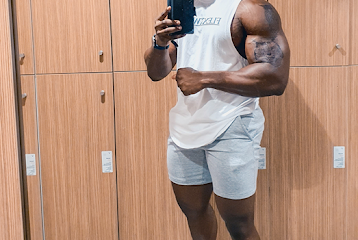Fitness & Wellness
Tips for Optimising Your Athletic Performance

Optimising your athletic performance is about more than just hard work; it requires a balanced approach to nutrition, training, and recovery. By focusing on what you eat, how you train, and how you recover, you can improve your overall performance and reach your goals. This article outlines essential tips to help athletes of all levels enhance their performance and well-being.
Key Takeaways
- Eating lean proteins supports muscle growth and recovery.
- Whole grains provide sustained energy for workouts.
- Fruits and vegetables are vital for vitamins and overall health.
- Healthy fats improve energy levels and nutrient absorption.
- Proper hydration is crucial for optimal performance.
1. Lean Proteins
Lean proteins are vital for athletes as they help in building and repairing muscle tissue. Including a variety of protein sources in your diet can significantly enhance your performance. Here are some excellent options:
- Chicken: A popular choice, low in fat and high in protein.
- Fish: Rich in omega-3 fatty acids, which are beneficial for recovery.
- Legumes: Great plant-based options like beans and lentils.
- Tofu: A versatile protein source for vegetarians and vegans.
Benefits of Lean Proteins
| Protein Source | Protein Content (per 100g) | Fat Content (per 100g) |
|---|---|---|
| Chicken Breast | 31g | 3.6g |
| Salmon | 25g | 13g |
| Tofu | 8g | 4.8g |
| Lentils | 9g | 0.4g |
Incorporating these proteins into your meals can help you recover faster and maintain muscle mass. Aim for protein sourced from lean meats, dairy, chicken, fish, eggs, and plant-based options, such as beans and tofu.
Including lean proteins in your diet not only supports muscle growth but also aids in overall recovery after workouts.
By ensuring you have a balanced intake of these proteins, you can optimise your athletic performance and achieve your fitness goals more effectively.
2. Whole Grains
Whole grains are a vital part of an athlete’s diet. They provide sustained energy and are packed with essential nutrients. Including whole grains like quinoa, brown rice, and oats can help maintain energy levels during workouts. Here are some benefits of whole grains:
- Energy Source: Whole grains are rich in complex carbohydrates, which are crucial for energy.
- Nutrient-Rich: They contain vitamins, minerals, and fibre that support overall health.
- Digestive Health: The fibre in whole grains aids digestion and helps keep you full longer.
| Whole Grain | Nutritional Benefits |
|---|---|
| Quinoa | High in protein and fibre |
| Brown Rice | Rich in magnesium and B vitamins |
| Oats | Good source of antioxidants |
Including complex carbohydrates like whole grains in your diet can ensure a steady supply of energy throughout workouts.
Incorporating whole grains into your meals can be simple. Here are a few easy ways to do it:
- Start your day with oatmeal topped with fruits.
- Use whole grain bread for sandwiches.
- Swap white rice for brown rice in your meals.
By making these small changes, you can significantly enhance your athletic performance.
3. Fruits and Vegetables
Fruits and vegetables are vital for athletes, providing essential vitamins, minerals, and antioxidants. Including a variety of colourful options can significantly enhance your performance. Here are some key benefits:
- Rich in Nutrients: They supply necessary vitamins and minerals that support overall health.
- Antioxidant Properties: Foods like blueberries and spinach help combat oxidative stress.
- Hydration: Many fruits and vegetables have high water content, aiding in hydration.
Recommended Fruits and Vegetables
| Fruit/Vegetable | Key Nutrient | Benefit |
|---|---|---|
| Blueberries | Antioxidants | Reduce inflammation |
| Spinach | Iron | Boost energy levels |
| Sweet Potatoes | Carbohydrates | Provide sustained energy |
Eating a variety of fruits and vegetables not only supports recovery but also helps in maintaining a balanced diet. Incorporate them into every meal for optimal benefits!
Make sure to aim for at least five servings of fruits and vegetables each day to maximise your athletic performance. This can include snacks like carrot sticks or a fruit smoothie, ensuring you get a mix of nutrients to fuel your body effectively.
Incorporating these foods into your diet can lead to improved recovery times and better overall health, making them a crucial part of any athlete’s nutrition plan.
4. Healthy Fats
Healthy fats are an important part of an athlete’s diet. They provide concentrated energy and help the body absorb vitamins that dissolve in fat. Here are some great sources of healthy fats to include in your meals:
- Avocados: Packed with nutrients and great for heart health.
- Nuts and seeds: Almonds, walnuts, and chia seeds are excellent choices.
- Olive oil: A versatile oil that can be used in cooking or as a dressing.
- Fatty fish: Salmon and mackerel are rich in omega-3 fatty acids, which are beneficial for recovery.
| Food Source | Type of Fat | Benefits |
|---|---|---|
| Avocado | Monounsaturated | Heart health, nutrient absorption |
| Nuts (e.g., almonds) | Polyunsaturated | Anti-inflammatory properties |
| Olive oil | Monounsaturated | Antioxidant-rich |
| Fatty fish | Omega-3 | Reduces muscle soreness |
Including healthy fats in your diet can help improve your overall performance and recovery. They are essential for maintaining energy levels during long workouts and competitions.
Incorporating these fats into your meals can enhance your athletic performance and support your health. Remember, moderation is key!
5. Dairy or Dairy Alternatives
Dairy products are a great source of calcium, which is essential for strong bones and muscle function. If you enjoy dairy, consider including low-fat options like milk, yoghourt, and cheese in your diet. For those who prefer not to consume dairy, there are many fortified plant-based alternatives available, such as almond milk and soy yoghourt.
Benefits of Dairy and Alternatives
- Calcium: Vital for bone health.
- Protein: Supports muscle repair and growth.
- Vitamins: Provides essential nutrients like vitamin D.
Comparison of Dairy and Dairy Alternatives
| Product Type | Calcium (mg) per serving | Protein (g) per serving | Calories per serving |
|---|---|---|---|
| Cow’s Milk (1 cup) | 300 | 8 | 103 |
| Almond Milk (1 cup) | 450 (fortified) | 1 | 30 |
| Soy Yoghourt (1 cup) | 300 (fortified) | 6 | 150 |
Choosing the right dairy or dairy alternative can significantly impact your athletic performance. Opt for options that are fortified with calcium and vitamin D to ensure you are meeting your nutritional needs.
6. Hydration

Staying properly hydrated is crucial for athletes to perform at their best. Dehydration can lead to decreased performance and even serious health issues. Here are some key points to consider:
- Drink water regularly throughout the day, not just during workouts.
- Pay attention to your body’s signals; if you feel thirsty, it’s a sign you need to hydrate.
- For intense or long workouts, consider using sports drinks to replenish lost electrolytes.
Hydration Tips:
- Before Exercise: Drink 500ml of water 2-3 hours before your workout.
- During Exercise: Aim for 200-300ml every 15-20 minutes.
- After Exercise: Rehydrate with 500ml of water or a sports drink within 30 minutes post-workout.
| Activity Level | Recommended Fluid Intake |
|---|---|
| Light Activity | 2-3 litres/day |
| Moderate Activity | 3-4 litres/day |
| Intense Activity | 4-6 litres/day |
Hydration is not just about drinking water; it’s about maintaining a balance of fluids and electrolytes to support your body’s needs during physical activity.
By following these hydration strategies, you can help ensure that your body is ready to perform at its peak, reducing the risk of fatigue and injury. Remember, keeping hydrated is key to your athletic success!
7. Pre- and Post-Workout Snacks
Snacking before and after workouts is crucial for maximising your performance and recovery. These snacks should ideally combine carbohydrates and proteins to fuel your body and aid in muscle repair.
Pre-Workout Snacks
- Timing: Aim to eat your snack 1-3 hours before exercising.
- Options:
- A banana with nut butter
- Greek yoghourt with berries
- A small protein shake with fruit
Post-Workout Snacks
- Timing: Consume your snack within 30-60 minutes after your workout.
- Options:
- A smoothie with protein powder and spinach
- Whole grain toast with avocado and poached egg
- Cottage cheese with pineapple
| Snack Type | Carbohydrates (g) | Protein (g) |
|---|---|---|
| Banana + Nut Butter | 30 | 4 |
| Greek Yoghourt + Berries | 20 | 10 |
| Protein Shake + Fruit | 25 | 20 |
Choosing the right snacks can significantly impact your energy levels and recovery. Focus on nutrient-dense options to support your athletic goals!
8. Supplementation
While a balanced diet is essential for athletes, supplementation can be beneficial in certain situations. It should not replace healthy eating but can support your performance. Here are some common supplements:
- Protein Powders: Great for muscle recovery.
- Omega-3 Fatty Acids: Help reduce inflammation.
- Vitamin D: Important for bone health.
- Creatine: Can enhance strength and power.
When to Supplement
Athletes may consider supplementation when:
- They struggle to meet their nutritional needs through food alone.
- They have specific dietary restrictions.
- They are training intensely and need extra support.
Always consult a healthcare professional before starting any supplements. They can help you determine what’s right for your needs.
In summary, supplementation can be a helpful tool, but it’s crucial to prioritise a wholesome diet first. Remember, what you fuel your body with directly impacts your performance!
9. Chiropractic Care
Chiropractic care can play a significant role in enhancing athletic performance. Regular visits to a chiropractor can help improve your overall physical condition. Here are some key benefits of chiropractic care for athletes:
- Improved Mobility: Chiropractic adjustments help to restore proper alignment to the spine and joints, which can enhance an athlete’s range of motion.
- Injury Prevention: By addressing skeletal issues early, chiropractors can help prevent injuries that may arise from poor posture or technique.
- Faster Recovery: Techniques like soft tissue mobilisation and targeted electrical stimulation can speed up recovery after workouts.
| Benefit | Description |
|---|---|
| Improved Mobility | Enhances range of motion and flexibility. |
| Injury Prevention | Identifies and corrects issues before they lead to injuries. |
| Faster Recovery | Reduces soreness and speeds up healing after physical activity. |
Regular chiropractic care not only helps in recovery but also optimises your training, allowing you to perform at your best.
10. Cross Training
Cross training is a fantastic way to improve your athletic performance. By mixing different types of workouts, you can enhance your overall fitness and reduce the risk of injury. Here are some key benefits of cross training:
- Variety: Engaging in different activities keeps your workouts interesting and enjoyable.
- Balanced Fitness: It helps develop various muscle groups, leading to a more balanced physique.
- Injury Prevention: By not overusing the same muscles, you lower the chance of injuries.
Suggested Cross Training Activities
| Activity | Benefits |
|---|---|
| Swimming | Low-impact, full-body workout |
| Cycling | Builds leg strength and endurance |
| Yoga | Improves flexibility and balance |
| Strength Training | Increases muscle power and tone |
| Running | Boosts cardiovascular fitness |
Cross training not only helps in building strength but also keeps your mind engaged, making workouts less monotonous.
Incorporating cross training into your routine can lead to better performance in your primary sport. Try to include at least two different activities each week to reap the full benefits!
11. Recovery Techniques
After intense physical activity, your body needs time to heal and regain strength. Proper recovery is essential for athletes to maintain peak performance and prevent injuries. Here are some effective recovery techniques:
1. Post-Exercise Nutrition
- Consume a recovery meal within 30-60 minutes after exercising. This meal should include a mix of carbohydrates and protein to help replenish energy and repair muscles.
- Focus on fast-digesting carbs like bananas or rice cakes, paired with high-quality protein sources such as chicken or Greek yoghourt.
2. Hydration
- Staying hydrated is crucial. Drink water regularly throughout the day and consider sports drinks during intense workouts to replace lost electrolytes.
- Aim for at least 2-3 litres of water daily, adjusting based on your activity level.
3. Active Recovery
- Engage in low-intensity activities like walking, cycling, or swimming on rest days. This helps to increase blood flow and reduce muscle soreness.
- Stretching and yoga can also aid in recovery by improving flexibility and reducing tension.
4. Sleep
- Prioritise quality sleep, as it plays a vital role in recovery. Aim for 7-9 hours of sleep each night to allow your body to repair itself.
- Create a calming bedtime routine to improve sleep quality.
5. Recovery Tools
- Consider using foam rollers or massage balls to relieve muscle tightness and improve circulation.
- Compression garments can also help reduce swelling and enhance recovery.
Remember, recovery is just as important as training. By incorporating these techniques, you can enhance your performance and reduce the risk of injury.
| Technique | Benefits |
|---|---|
| Post-Exercise Nutrition | Replenishes energy and repairs muscles |
| Hydration | Maintains fluid balance and performance |
| Active Recovery | Reduces soreness and improves flexibility |
| Sleep | Aids in muscle repair and recovery |
| Recovery Tools | Enhances circulation and reduces tightness |
12. Warm-Up Routines
Warming up is a crucial part of any athletic training session. A proper warm-up prepares your body for exercise and helps prevent injuries. Here are some key components of an effective warm-up routine:
1. Active Warm-Up
- Start with total body movements at a low intensity.
- Gradually increase effort and specificity to your event.
- Controlled, easier movements help to prepare your muscles.
2. Dynamic Stretching
- Incorporate dynamic stretches to improve flexibility.
- Focus on movements that mimic your sport, such as leg swings or arm circles.
- This helps to increase blood flow to your muscles.
3. Sport-Specific Drills
- Include drills that are specific to your sport.
- For example, sprinters might do high knees or butt kicks.
- This prepares your body for the specific movements you will perform.
4. Duration
- Aim for a warm-up lasting 10 to 15 minutes.
- This is enough time to prepare your body without tiring it out.
5. Cool Down
- After your workout, don’t forget to cool down.
- This helps your body recover and reduces muscle soreness.
Warming up is not just about preventing injuries; it also enhances your performance by getting your body ready for action.
By following these steps, you can ensure that your warm-up routine is effective and beneficial for your athletic performance. Remember, a good warm-up can make all the difference!
13. Flexibility Exercises
Flexibility is crucial for athletes as it helps improve performance and reduce the risk of injuries. Incorporating regular stretching into your routine can enhance your overall athletic ability. Here are some key points to consider:
Benefits of Flexibility Exercises
- Improved Range of Motion: Regular stretching can help increase your flexibility, allowing for better movement.
- Reduced Muscle Tension: Stretching helps relax tight muscles, which can enhance performance.
- Injury Prevention: Flexible muscles are less likely to get injured during physical activities.
Recommended Stretching Techniques
- Static Stretching: Hold a stretch for about 10 to 30 seconds, targeting all major muscle groups.
- Dynamic Stretching: Involves moving parts of your body through a full range of motion, ideal for warming up.
- Proprioceptive Neuromuscular Facilitation (PNF): A more advanced technique that involves both stretching and contracting the muscle group being targeted.
| Stretch Type | Duration | Frequency |
|---|---|---|
| Static | 10-30 seconds | 3-4 times a week |
| Dynamic | 5-10 minutes | Before workouts |
| PNF | 15-30 seconds | 2-3 times a week |
Flexibility exercises are essential for athletes of all levels. They not only improve performance but also help in recovery and injury prevention.
Incorporating these exercises into your training routine can lead to better results and a healthier athletic career.
14. Strength Training
Strength training is vital for athletes looking to improve their performance. It helps build muscle, increase power, and enhance overall athletic ability. Here are some key points to consider:
- Types of Strength Training:
- Benefits of Strength Training:
Sample Strength Training Routine
| Exercise | Sets | Reps |
|---|---|---|
| Squats | 3 | 8-12 |
| Bench Press | 3 | 8-12 |
| Deadlifts | 3 | 8-12 |
| Pull-Ups | 3 | 6-10 |
| Plank | 3 | 30s |
Strength training should be tailored to your specific sport and goals. Always consult a coach or trainer to ensure proper technique and avoid injury.
Incorporating strength training into your routine can significantly boost your performance and help you excel in your sport. Remember, consistency is key!
15. Endurance Training
Endurance training is vital for athletes looking to improve their stamina and overall performance. Building endurance helps you last longer during competitions and workouts. Here are some key points to consider:
- Types of Endurance Training:
- Benefits of Endurance Training:
- Training Tips:
| Training Type | Duration | Frequency |
|---|---|---|
| Long Runs | 60-120 min | 1-2 times/week |
| Tempo Runs | 30-60 min | 1 time/week |
| Interval Training | 20-40 min | 1-2 times/week |
Endurance training is not just about physical strength; it also builds mental resilience, which is crucial for athletes.
Incorporating these elements into your routine can significantly enhance your endurance and overall athletic performance. Remember, consistency is key!
16. Mental Conditioning
Mental conditioning is a vital part of enhancing your athletic performance. It involves training your mind to improve focus, resilience, and motivation. A strong mindset can significantly impact your performance on the field or track. Here are some key strategies to consider:
Techniques for Mental Conditioning
- Goal Setting: Establish clear, achievable goals to guide your training and performance. This is one of the most frequently used mental tools by sports psychologists to improve athletic performance.
- Visualisation: Imagine yourself succeeding in your sport. This technique can help build confidence and prepare you for competition.
- Mindfulness: Practise being present in the moment. This can reduce anxiety and improve concentration during events.
Benefits of Mental Conditioning
- Improved Focus: Helps you concentrate better during training and competitions.
- Increased Resilience: Builds your ability to bounce back from setbacks.
- Enhanced Motivation: Keeps you driven to achieve your goals.
Mental conditioning is not just about winning; it’s about developing a mindset that supports your overall growth as an athlete.
Incorporating these techniques into your training routine can lead to better performance and a more fulfilling athletic experience.
17. Goal Setting
Setting clear goals is essential for athletes aiming to improve their performance. SMART goals can help you stay focused and motivated. Here’s how to set them effectively:
1. Specific
Get clear on what you want to achieve. For example, instead of saying “I want to run faster,” specify “I want to run a 5K in under 25 minutes.”
2. Measurable
How will you know when the goal has been accomplished? Use numbers or milestones to track your progress. For instance, aim to reduce your 5K time by 1 minute each month.
3. Achievable
Goals should be realistic. Setting a goal to run a marathon next week might not be feasible if you’ve just started training. Instead, aim for a half-marathon in six months.
4. Relevant
Ensure your goals align with your overall athletic ambitions. If your main focus is on improving your sprinting, don’t set a goal to swim faster.
5. Time-bound
Set a deadline for your goals. This creates urgency and helps you stay committed. For example, aim to achieve your goal by the end of the season.
Example of SMART Goals for Athletes
| Goal Type | Example Goal |
|---|---|
| Specific | Run a 5K in under 25 minutes |
| Measurable | Reduce 5K time by 1 minute monthly |
| Achievable | Train for a half-marathon in 6 months |
| Relevant | Focus on sprinting improvements |
| Time-bound | Achieve goal by end of the season |
Setting goals is not just about the destination; it’s about the journey and the progress you make along the way.
By following these steps, you can create a clear path to success and enhance your athletic performance.
18. Sleep Hygiene
Getting enough quality sleep is crucial for athletes to perform at their best. Good sleep hygiene can help improve recovery, focus, and overall performance. Here are some tips to enhance your sleep:
1. Create a Sleep Schedule
- Go to bed and wake up at the same time every day.
- Aim for 7-9 hours of sleep each night.
- Avoid long naps during the day.
2. Create a Relaxing Environment
- Keep your bedroom dark, quiet, and cool.
- Use comfortable bedding and pillows.
- Limit noise and distractions, such as electronic devices.
3. Limit Stimulants
- Avoid caffeine and nicotine in the hours leading up to bedtime.
- Reduce screen time from phones and computers before sleep.
- Consider herbal teas or warm milk to help you relax.
4. Wind Down Before Bed
- Engage in calming activities, like reading or meditation.
- Stretch or do light yoga to relax your muscles.
- Set aside time to reflect on your day and plan for tomorrow.
Sleep is essential for recovery and performance. Prioritising good sleep hygiene can lead to better athletic outcomes.
By following these tips, athletes can improve their sleep quality, which in turn can enhance their performance and overall well-being. Remember, consistent sleep patterns are key to achieving optimal results in your training and competitions.
19. Injury Prevention
Injury prevention is crucial for athletes of all levels. Staying hydrated and maintaining proper nutrition are key components of injury prevention. Here are some effective strategies to help you avoid injuries:
- Warm-Up Properly: Always start with a warm-up to prepare your muscles and joints for activity.
- Use Correct Techniques: Focus on using the right form during exercises and sports to reduce strain.
- Listen to Your Body: Pay attention to any signs of pain or discomfort and rest when needed.
Key Points to Remember:
- Hydration: Drink plenty of water before, during, and after exercise to prevent dehydration.
- Nutrition: A balanced diet supports muscle recovery and overall health.
- Rest: Ensure you get enough sleep and take rest days to allow your body to recover.
| Strategy | Description |
|---|---|
| Warm-Up | Prepares muscles for activity |
| Correct Techniques | Reduces risk of strain and injury |
| Hydration | Prevents dehydration and muscle cramps |
| Nutrition | Supports recovery and performance |
| Rest | Allows muscles to recover and grow stronger |
Remember, taking care of your body is essential for long-term athletic success. Regular check-ups with a healthcare professional can also help identify potential issues before they become serious injuries.
20. Nutrition Timing
Nutrition timing is essential for athletes aiming to enhance their performance. Eating at the right times can significantly impact your energy levels and recovery. Here are some key points to consider:
Pre-Exercise Nutrition
- Timing: Aim to eat a balanced meal 1-3 hours before exercising.
- Composition: Focus on carbohydrates for energy, along with a moderate amount of protein.
- Avoid: High-fat and high-fibre foods to prevent digestive discomfort.
Post-Exercise Nutrition
- Recovery Window: Consume a meal or snack within 30-60 minutes after exercising.
- What to Include: A mix of fast-digesting carbohydrates and high-quality protein to replenish glycogen and support muscle repair.
- Hydration: Don’t forget to rehydrate with water or electrolyte drinks.
Daily Nutrition Strategy
- Spread Meals: Distribute your meals evenly throughout the day to maintain energy levels.
- Listen to Your Body: Adjust your intake based on your training intensity and duration.
- Plan Ahead: Prepare meals and snacks in advance to avoid missing key nutrition windows.
Nutrition timing is not just about what you eat, but when you eat it. Proper timing can help you achieve your fitness goals more effectively.
By understanding and implementing effective nutrition timing, athletes can optimise their performance and recovery, ensuring they are always at their best.
21. Sports Psychology
Sports psychology is a vital aspect of athletic performance, focusing on the mental factors that influence an athlete’s success. Understanding your mindset can significantly enhance your performance. Here are some key areas to consider:
Key Areas of Focus
- Mental Resilience: Developing the ability to bounce back from setbacks.
- Focus and Concentration: Techniques to maintain attention during competitions.
- Goal Setting: Establishing clear, achievable objectives to guide training and performance.
Benefits of Sports Psychology
- Improved Performance: Athletes often see better results when they manage their mental state effectively.
- Enhanced Motivation: A strong mental approach can keep athletes motivated through tough training sessions.
- Stress Management: Learning to cope with pressure can lead to more consistent performances.
Engaging with a sports psychologist can help athletes unlock their full potential by addressing mental barriers and enhancing focus.
Conclusion
Incorporating sports psychology into your training routine can lead to significant improvements in both performance and enjoyment of the sport. By focusing on mental strategies, athletes can achieve a more balanced and effective approach to their training and competitions.
22. Performance Tracking
Tracking your performance is essential for any athlete looking to improve. Monitoring your progress helps identify strengths and weaknesses, allowing you to adjust your training accordingly. Here are some effective methods to track your performance:
1. Use a Training Journal
- Record daily workouts, including exercises, sets, and reps.
- Note how you feel during and after workouts.
- Track your nutrition and hydration.
2. Set Specific Goals
- Establish short-term and long-term goals.
- Use SMART criteria (Specific, Measurable, Achievable, Relevant, Time-bound).
- Regularly review and adjust your goals based on progress.
3. Leverage Technology
- Use apps or wearable devices to monitor metrics like heart rate, distance, and speed.
- Analyse data to find patterns in your performance.
- Share your progress with coaches or training partners for feedback.
Performance Tracking Table
| Metric | Description | Frequency |
|---|---|---|
| Workout Duration | Total time spent training | Daily |
| Distance Covered | Total distance run or cycled | Weekly |
| Personal Bests | Record of best performances | Monthly |
Regular performance tracking not only boosts motivation but also helps in making informed decisions about your training regimen. By understanding your progress, you can make necessary adjustments to reach your athletic goals more effectively.
Incorporating these strategies into your routine can lead to significant improvements in your athletic performance. Remember, consistency is key!
23. Coaching Support

Having the right coaching support can make a significant difference in an athlete’s performance. Coaches not only provide guidance but also help in developing skills and strategies tailored to individual needs. Here are some key aspects of effective coaching support:
Key Aspects of Coaching Support
- Personalised Training Plans: Coaches should create training plans that fit the athlete’s specific goals and abilities.
- Feedback and Assessment: Regular feedback helps athletes understand their strengths and areas for improvement.
- Motivation and Encouragement: A good coach inspires athletes to push their limits and stay committed.
Coaching is not just about training; it’s about building a relationship that fosters growth and success.
Benefits of Coaching Support
| Benefit | Description |
|---|---|
| Skill Development | Coaches help refine techniques and skills. |
| Mental Toughness | Coaches teach athletes how to handle pressure. |
| Injury Prevention | Coaches can identify risks and suggest precautions. |
In conclusion, effective coaching support is essential for athletes aiming to optimise their performance. With the right guidance, athletes can reach their full potential and achieve their goals.
24. Equipment Selection
Choosing the right equipment is essential for maximising your athletic performance. The right gear can make a significant difference in how you train and compete. Here are some key points to consider when selecting your equipment:
- Fit and Comfort: Ensure that your gear fits well and is comfortable. Ill-fitting equipment can lead to injuries and hinder performance.
- Quality and Durability: Invest in high-quality equipment that can withstand the rigours of your training. Cheaper options may save money initially but can lead to more expenses in the long run.
- Specificity: Choose equipment that is tailored to your sport. For example, runners need different shoes compared to cyclists.
Equipment Checklist
| Type of Equipment | Key Features | Recommended Brands |
|---|---|---|
| Footwear | Comfort, support, and grip | Nike, Adidas, Asics |
| Clothing | Breathability and moisture-wicking | Under Armour, Lululemon |
| Accessories | Functionality and ease of use | Garmin, Fitbit |
Selecting the right equipment is not just about performance; it also plays a crucial role in injury prevention. Always prioritise safety and comfort when making your choices.
25. Training Environment and More
Creating the right training environment is essential for athletes looking to enhance their performance. A supportive atmosphere can significantly impact motivation and results. Here are some key factors to consider:
1. Space and Equipment
- Ensure you have access to adequate space for your workouts.
- Use proper equipment that suits your training needs.
- Keep the training area clean and organised to avoid distractions.
2. Supportive Community
- Surround yourself with like-minded individuals who share your goals.
- Engage in group training sessions to boost motivation.
- Seek feedback and encouragement from peers and coaches.
3. Mental Focus
- Create a distraction-free zone to help maintain concentration.
- Use music or motivational quotes to enhance your mindset.
- Practise mindfulness techniques to improve focus during training.
A positive training environment can lead to improved performance and a greater sense of achievement. Feeling valued and connected in your training space can motivate you to push your limits.
4. Weather Conditions
- Train in suitable weather to avoid injuries and fatigue.
- Consider indoor options during extreme weather conditions.
- Adapt your training schedule based on seasonal changes.
5. Safety Measures
- Always prioritise safety by using proper techniques and equipment.
- Be aware of your surroundings to prevent accidents.
- Have a first aid kit accessible in case of emergencies.
By focusing on these aspects, you can create a training environment that not only supports your physical needs but also enhances your overall performance. Remember, the right environment can make all the difference!
Final Thoughts on Enhancing Athletic Performance
In conclusion, optimising your athletic performance is a journey that involves various elements. By focusing on a balanced diet, staying hydrated, and ensuring proper recovery, you can significantly boost your abilities. Remember, what you eat fuels your body, so choose wisely. Incorporating a mix of proteins, carbohydrates, and healthy fats will provide the energy you need for training and competition. Additionally, listening to your body and adjusting your nutrition and training as needed is vital. With dedication and the right approach, you can reach your full potential and enjoy the process of becoming a better athlete.
Frequently Asked Questions
What are lean proteins and why are they important for athletes?
Lean proteins, like chicken and fish, help build and repair muscles. They are crucial for athletes to recover from workouts and improve strength.
How do whole grains benefit athletic performance?
Whole grains provide energy for workouts. Foods such as brown rice and oats give athletes the stamina they need to perform well.
Why should I eat fruits and vegetables as an athlete?
Fruits and vegetables are packed with vitamins and minerals. They help keep your body healthy and support recovery after exercise.
What are healthy fats, and how do they help athletes?
Healthy fats, found in foods like avocados and nuts, provide energy and help the body absorb important vitamins.
Is dairy important for athletes, and what if I’m lactose intolerant?
Dairy products are good sources of calcium, which is essential for strong bones. If you’re lactose intolerant, you can try dairy alternatives like almond milk.
How much water should I drink during training?
Staying hydrated is key. Athletes should drink water before, during, and after workouts to keep their bodies functioning well.
What snacks should I eat before and after workouts?
Good snacks include fruits, yoghourt, or a protein shake. These help fuel your workout and aid recovery afterward.
When should I consider taking supplements?
Supplements can be helpful if your diet lacks certain nutrients. It’s best to talk to a doctor or dietitian before starting any supplements.
-

 Press Release5 days ago
Press Release5 days agoClinical Trials Market Set for Robust Growth, Driven by Drug Development Surge and Digital Innovation
-

 Press Release5 days ago
Press Release5 days agoGreen Bio Chemicals Market Poised for Sustainable Growth amidst Global Shift to Eco-Friendly Alternatives by 2035
-

 Press Release5 days ago
Press Release5 days agoFill-Finish Pharmaceutical Contract Manufacturing Market Expected to Flourish Amid Biopharmaceutical Boom and Global Outsourcing Trend by 2035
-

 Business6 days ago
Business6 days agoHow Managed IT Solutions Help Small Teams Compete at Enterprise Scale
-

 Press Release5 days ago
Press Release5 days agoIndustrial Boiler Market Expected to Surpass USD 24.4 Billion by 2035 Amid Growing Demand for Energy Efficiency and Industrialization
-

 Press Release5 days ago
Press Release5 days agoPreventive Vaccines Market to Witness Strong Growth by 2035
-

 Press Release5 days ago
Press Release5 days agoPet Food Nutraceutical Market Set for Robust Expansion Amid Rising Demand for Pet Wellness by 2035
-

 Press Release5 days ago
Press Release5 days agoWaterproof Structural Adhesives Market: A Comprehensive Study Towards USD 10.3 Billion in 2035






























